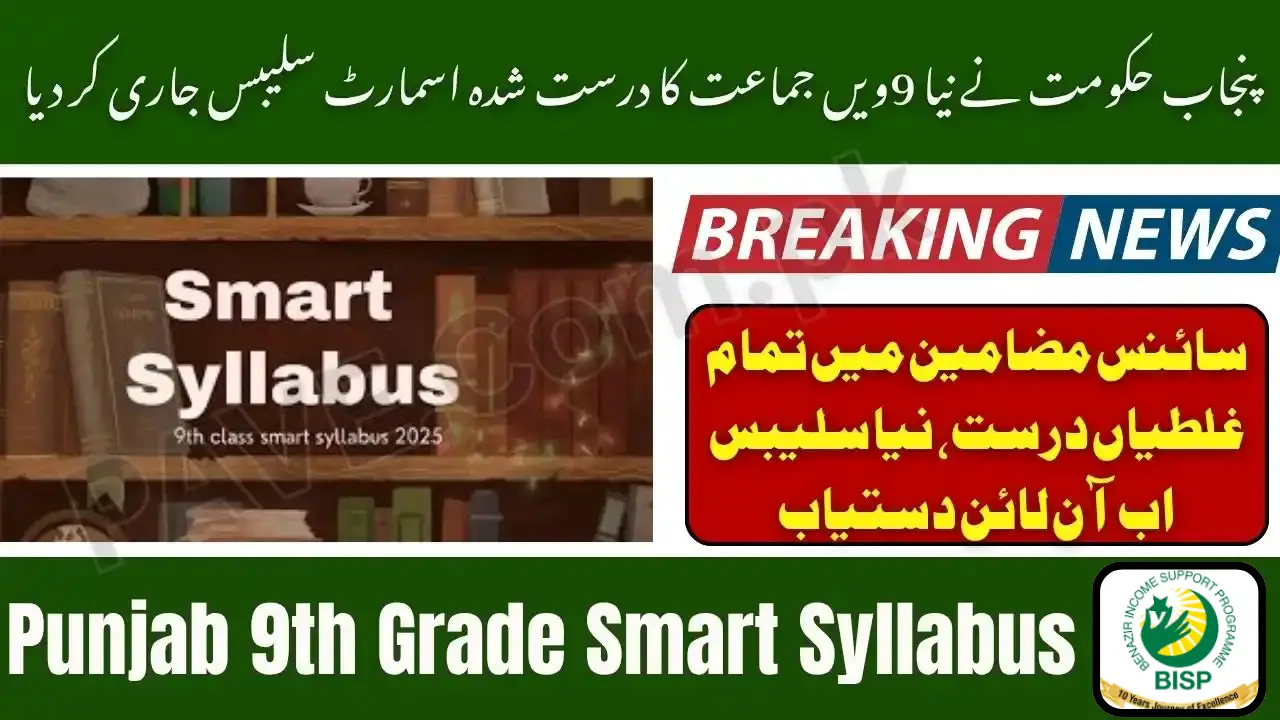Revised 9th Grade Smart Syllabus Now Released by PECTA – What’s New?
The Revised 9th Grade Smart Syllabus has been officially released by the Punjab Education Curriculum and Textbook Board (PECTA) for the 2025-2026 academic year. This update is aimed at improving the quality of education by reducing the content load and making learning more manageable for students. The new syllabus is designed to focus on essential subjects, align better with examination requirements, and encourage a shift from rote learning to conceptual understanding. With a clearer and more focused approach, the Revised 9th Smart Syllabus promises to offer a more effective educational experience.
As part of this overhaul, many unnecessary topics have been removed, and more emphasis is being placed on understanding core concepts that are critical for student success. The updated syllabus is expected to help reduce student stress, create more time for in-depth learning, and foster better comprehension. This revision is a response to the growing concern about the overload of content in school curriculums and the need for more streamlined, targeted education that aligns with the skills required in real-life applications.
Features of the Revised 9th Grade Smart Syllabus
The Revised 9th Grade Smart Syllabus brings several significant changes that aim to improve learning outcomes. Here are the main features of the new syllabus:
| Feature | Description |
|---|---|
| Reduced Content Load | Several chapters and units that were previously considered non-essential have been removed. |
| Conceptual Learning Focus | The syllabus emphasizes the understanding of core concepts over memorization. |
| Streamlined Textbooks | Textbooks are simplified, and in some subjects, a unified textbook has been introduced. |
| Practical Applications | More real-world applications are incorporated into subjects like science and mathematics. |
With fewer topics to cover, students can now concentrate on mastering key subjects and concepts that are more likely to appear on exams, making it easier for them to achieve academic success without being overwhelmed.
Punjab Govt Launches CM Dialysis Card 2025
Changes in Subject Content
The Revised 9th Grade Syllabus introduces notable changes in various subjects, particularly in the core areas like mathematics, science, and English. For example, in mathematics, the major shift is the introduction of a unified textbook for both arts and science streams, ensuring that all students follow the same content. This change eliminates the previous divide between the two streams, allowing for a more consistent educational experience across different academic tracks.
In science subjects like biology and chemistry, less critical topics have been removed. The focus is now on teaching foundational principles and key concepts rather than delving into overly detailed or advanced topics. This will allow students to grasp the basic ideas before progressing to more complex material in later years. English has also seen a reduction in supplementary reading material, with more focus on strengthening language skills and literary comprehension.
Conceptual Learning Over Memorization
A major focus of the 9th Grade Smart Syllabus is shifting from rote memorization to conceptual understanding. Instead of merely memorizing facts for exams, students are encouraged to understand the logic and reasoning behind concepts in subjects such as mathematics, science, and social studies. This shift is expected to improve long-term retention and equip students with problem-solving skills that will be useful both in academic settings and in everyday life.
By focusing on understanding the ‘why’ and ‘how’ of various concepts, the new syllabus ensures that students develop a deeper understanding, making learning more meaningful and applicable. For instance, in mathematics, students will learn not just to apply formulas but also to understand their derivation and real-world applications.
Benefits of the Revised 9th Smart Syllabus
The Revised 9th Smart Syllabus offers several advantages for students and schools alike:
- Manageable Workload: Students will have more time to master important topics without the stress of cramming through unnecessary material.
- Improved Comprehension: By focusing on core concepts, students can develop a stronger understanding of each subject, which will help in both exams and practical applications.
- Fairer Examination System: With a more consistent syllabus, students across different schools and streams will be better prepared for exams, ensuring a more level playing field.
- Better Resource Allocation: Teachers can now focus their lessons on the key areas that matter most, ensuring that classroom time is used efficiently.
BISP 8171 Balance Check Online via CNIC
How Students Can Adapt to the Revised Syllabus
To make the most of the Revised 9th Smart Syllabus, students should take the following steps:
- Review the New Syllabus: Students should carefully go through the revised syllabus to identify which topics have been removed and which have been simplified. This will help them focus their study efforts on the most important content.
- Create a Study Plan: With the reduced content load, students can now create a more focused study plan, allocating time to master key concepts and subjects.
- Understand, Don’t Memorize: Students should focus on understanding the concepts rather than memorizing them. This approach will ensure they retain knowledge longer and can apply it in different contexts.
- Use Practice Papers and Past Exams: To prepare effectively for exams, students should practice with past papers and model exams aligned with the revised syllabus.
Conclusion
The Revised 9th Grade Smart Syllabus is a significant step toward making education in Punjab more focused, effective, and manageable for students. By removing unnecessary topics, emphasizing core concepts, and simplifying textbooks, this revision aims to provide a clearer path to academic success.
Students who adapt to this updated syllabus will find themselves better equipped to tackle exams and gain a deeper understanding of the subjects they study. The move from rote learning to conceptual understanding is expected to lead to better long-term outcomes, both academically and in practical applications. With a clear focus on the essentials, the revised syllabus promises to be a more efficient, balanced, and student-friendly approach to education.






